Tequila, a famous and popular drink, is widely loved and consumed, but one question often haunts us – does tequila go bad?
Tequila, the distilled spirit of Mekisa, has enjoyed international popularity for centuries and is a must-have party drink.
The strong flavors of tequila appeal to the taste buds of spirits lovers around the world. However, one question often haunts us – does tequila spoil?
This comprehensive guide is designed to address all your concerns about tequila’s shelf life, storage, and potential spoilage.
If you are an alcohol lover, these articles may be of use to you:
How long does brandy last once opened, Can gin go bad in heat, does vodka go bad, does whiskey go bad, does rum go bad, does Campari go bad, Does Triple Sec Go Bad, How Long Does Champagne Last, and does beer go bad in heat?
Does Tequila Go Bad?
Both yes and no. Tequila is a durable alcoholic beverage with an alcohol content of 35% to 55% and does not go bad unless opened. But if you don’t consume an opened tequila within a year, it will go bad.
In high-alcohol drinks like tequila, microbes can’t find a place to live, making it harder for tequila to go bad. However, the quality of tequila can degrade under certain conditions, such as improper storage or prolonged exposure to heat.
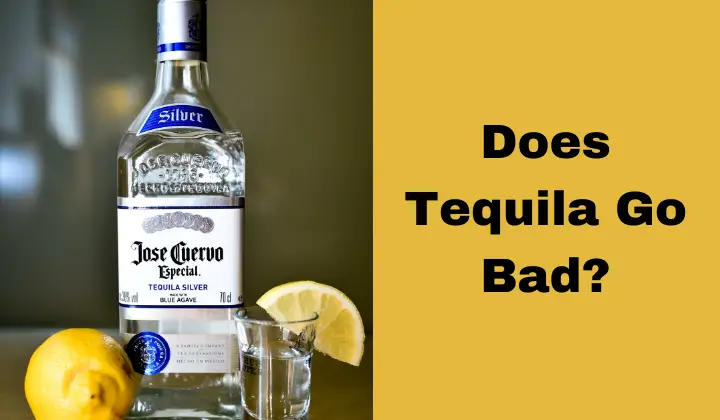
How Long Does Unopened Tequila Last?
Unopened and stored in the right conditions, plain tequila can last forever. However, it should be kept in mind that flavored tequilas can deteriorate over time and their quality will decrease.
To prevent tequila from going bad, it is best to store it for 3-4 years and consume it in time.
How Long Does Opened Tequila Last?
Once a tequila bottle is opened, the oxidation process begins and the spirit slowly begins to lose its quality and deteriorate.
However, if stored properly, opened tequila can retain its flavor and strength for up to 1-2 years, but it’s best not to consume tequila that has been left open for extended periods of time.
Does Tequila Spoil in the Sun?
Like other alcoholic beverages, tequila is not good with sunlight. Tequila that stays in the sun for a long time will deteriorate over time. But this is not exactly a “spoil”. You can think of it as a worsening of taste and loss of quality.
Sunlight, especially the ultraviolet (UV) component, can cause chemical reactions in tequila. Over time, this exposure can alter the composition of the spirit, affecting its taste, aroma, and overall quality. Additionally, the heat associated with sun exposure can speed up the evaporation process, causing the alcohol to lose its potency.
Here’s a breakdown of what happens when your tequila gets too much sun:
- 1. Flavor and Aroma Degradation
Tequila’s intricate flavors and aromas come from its specific ingredients and careful distillation process. Exposing the spirit to sunlight can lead to a breakdown of these delicate flavor compounds, resulting in a flat or altered taste. The once vibrant and nuanced notes of agave, citrus, or oak (in aged tequilas) can diminish, leaving you with a lackluster spirit. - 2. Evaporation and Oxidation
When subjected to heat from sunlight, the rate of alcohol evaporation inside the bottle accelerates. If the bottle is sealed, this can lead to a pressure build-up. If the bottle is open, you might just find that some of your tequila has “disappeared.” Furthermore, the heat can speed up the oxidation process, where the alcohol reacts with air to form other compounds, again leading to changes in taste and aroma. - 3. Color Changes
Particularly in darker, aged tequilas, sun exposure can result in noticeable color changes. The vibrant amber hue might fade to a lighter color, hinting at the changes occurring in the liquid itself.
In summary, while your tequila might not spoil in the traditional sense (i.e., become unsafe to drink) due to sun exposure, its quality – the taste, aroma, and appearance that make tequila enjoyable – can be negatively impacted. To preserve your tequila’s integrity, it’s best to store it in a cool, dark place, away from direct sunlight.
Decoding Tequila’s Shelf Life: Does it Have an Expiry Date?
If you’ve ever searched for an expiry date on a bottle of tequila and come up empty-handed, you’re not alone. Most spirits, including tequila, don’t carry an explicit ‘best before’ or ‘expiry’ date.
This is primarily because the high alcohol content of these beverages makes them less susceptible to bacterial growth and spoilage compared to perishable food or lower-alcohol-content beverages.
However, while tequila can technically last indefinitely under the right conditions, its quality may start to deteriorate after a certain period, especially if the bottle has been opened.
So, even though you won’t find a hard-and-fast expiry date, there are some general guidelines you can follow to estimate the ‘peak’ lifespan of your tequila.
How to Store Unopened Tequila?
An unopened bottle of tequila can last for many years, even decades, without significant quality loss, as long as it’s stored properly – in a cool, dark place with a stable temperature. In theory, a sealed bottle of tequila can even be passed down through generations!
However, minor alterations in taste might occur over very long periods, especially in tequilas that are stored in barrels.
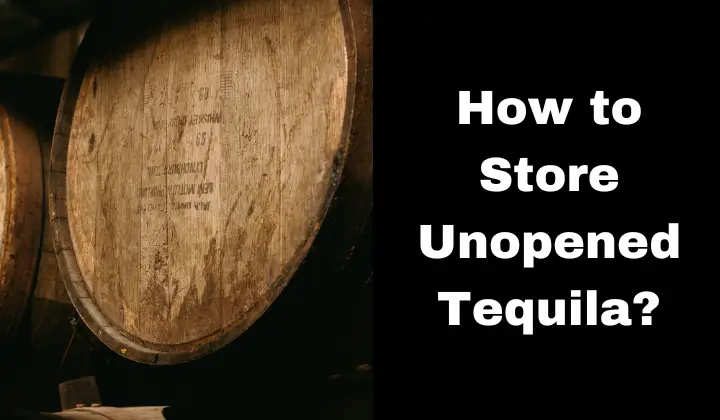
How to Store Opened Tequila?
Once opened, a bottle of tequila is exposed to air, beginning the oxidation process. This can slowly start to affect the tequila’s flavor and aroma.
Typically, an opened bottle of tequila can retain its best quality for one to two years. However, as long as it’s stored properly (upright and tightly sealed), it will still be safe to drink for several years beyond this point, though the flavor may be somewhat diminished.
How to Detect Deterioration in Tequila: Identifying Ambiguous Signs
Recognizing spoiled tequila is a subtle art that involves a combination of observation and sensory cues. While tequila is a resistant alcoholic beverage due to its high alcohol content, it is not completely immune to spoilage under certain conditions.
If you’re not sure your tequila is out of date, you should check out these tips:
1. Visual Changes: Clarity and Color
The first sign of deterioration is usually a change in the visual appearance of the tequila.
Fresh, intact tequila is usually clear or has a slightly golden hue, depending on the variety (Blanco, reposado, or añejo).
If your tequila has a cloudy appearance or has visible sediment on the bottom, this may be an indication that the tequila is starting to deteriorate.
2. Unpleasant Smell
The flavor of tequila is a symphony of notes, typically agave, citrus, and some oak in aged tequilas. If you detect a strong, repulsive odor that is different from these familiar flavors, your tequila may be spoiled.
Deteriorated tequila can have a sharp, pungent odor reminiscent of vinegar or sour, fermented fruit.
3. Mushroom Deterioration
A splintered or moldy cork is another sure sign of tequila spoilage. If the cork is crumbling or showing signs of mold, air, and moisture have seeped into the bottle and potentially spoiled.
4. Change in Flavor Profile
While taste testing is your last resort (especially if visual and odor checks show deterioration), a sudden change in your tequila’s flavor profile can also be an indicator.
Fresh tequila should have a smooth, slightly sweet, and complex flavor. If the taste is excessively sour, bitter, or somehow “bad”, it is best to be cautious and avoid consumption.
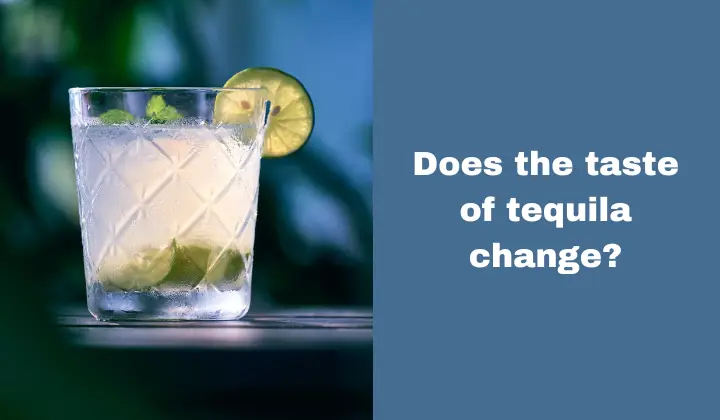
Is It Safe to Drink Tequila That Has Gone Bad?
While the terms “spoiled” or “bad” may sound alarming, it’s crucial to understand that, unlike perishable foods, tequila doesn’t spoil in a way that makes it harmful to consume. The high alcohol content creates an environment unsuitable for bacteria and microorganisms that could cause food poisoning.
However, it’s not a question of safety but rather one of quality. Tequila that has “gone bad” typically refers to a spirit that has been improperly stored or left open for a significant period, leading to a noticeable degradation in its taste, aroma, and appearance.
So, while you technically can drink tequila that has “gone bad,” the experience will likely be far from enjoyable.
Instead of the vibrant, complex flavors and aroma that define this spirit, spoiled tequila might offer a flat, altered, or even unpleasant taste. Consequently, it’s generally not recommended to drink tequila that shows signs of spoilage, especially if there are other indications such as a deteriorated cork or bottle damage.
What Can You Do With Spoiled Tequila?
Discovering a bottle of spoiled tequila might feel like a disappointment, but it doesn’t necessarily mean it’s destined for the drain.
If the spirit has merely degraded in quality and doesn’t have any visible mold or other worrying signs, there are several ways you could repurpose it:
- Culinary Adventures
Consider using spoiled tequila in cooking. Similar to using wine in recipes, tequila can add a unique flavor profile to dishes. Marinating meats or creating boozy desserts could be an innovative way to utilize the spirit.
- DIY Cleaning Agent
Alcohol is a great disinfectant. Your spoiled tequila, diluted with water, could be used to clean countertops, stainless steel appliances, or even glass. However, be mindful of the smell it might leave behind.
- Garden Helper
You might be surprised, but spoiled alcohol can also be used as a homemade pest repellent in your garden. Remember to dilute it substantially to prevent any potential damage to your plants.
Remember, these alternative uses are recommended only for tequila that has degraded in quality but has not developed any potentially harmful characteristics like mold. Always use common sense and err on the side of caution when dealing with spoiled food or drink products.
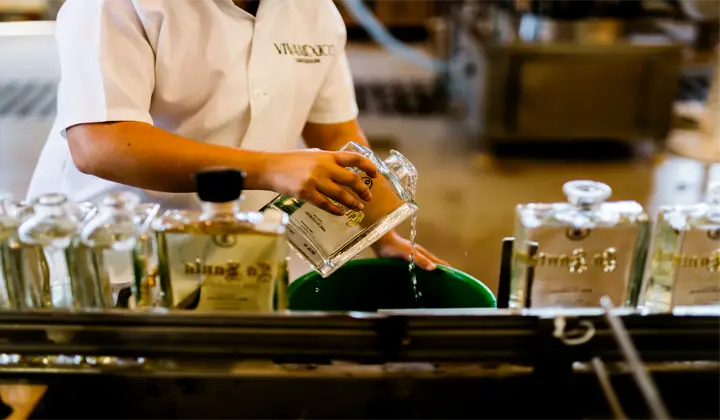
Brand Variations in Tequila Shelf Life: Does the Label Make a Difference?
When discussing the shelf life and spoilage of tequila, an important question often emerges: Does the brand of tequila influence its longevity? While the brand itself doesn’t directly determine whether or not the tequila will go bad, certain factors related to a brand’s production and packaging processes can indeed play a role.
Quality of Production
Brands that prioritize high-quality production and packaging processes tend to produce tequilas that are more resistant to spoilage. This includes using premium, well-sanitized bottles, and high-quality corks or caps, and maintaining strict quality controls during the distillation process.
For instance, brands producing 100% agave tequila typically deliver a product of higher quality and stability compared to those making a mix of tequila (a blend of agave and other sugars). This is because pure agave tequila is less likely to contain impurities that could potentially impact shelf life.
Packaging and Sealing
The type of closure used by the brand can also influence the shelf life of tequila. High-quality corks or screw caps create a better seal, limiting the amount of oxygen that can interact with the tequila, which in turn slows the oxidation process.
Storage Instructions
Finally, some brands provide specific storage instructions on their labels, which, if followed, can help maintain the quality of the tequila for a longer time. These instructions can include storing the bottle upright, keeping it in a cool, dark place, or even refrigerating it after opening (though this is not usually necessary for tequila).
Questions about does tequila go bad
Let’s try to answer some questions together about does tequila go bad.
Can tequila go bad?
While tequila doesn’t spoil in the traditional sense due to its high alcohol content, it can degrade in quality over time, especially if not stored properly or left open for a long time.
How can I tell if my tequila has gone bad?
Signs that your tequila may have degraded include a change in color, a cloudy appearance, sediment at the bottom of the bottle, an off-putting smell, and a change in flavor.
Is it safe to drink tequila that has gone bad?
While it’s not harmful to consume tequila that has degraded in quality, it won’t offer the same enjoyable taste and aroma as fresh tequila.
Does sunlight affect tequila?
Yes, prolonged exposure to sunlight can degrade the quality of tequila, leading to alterations in its taste, aroma, and color.
How long does an unopened bottle of tequila last?
An unopened bottle of tequila can last for many years, even decades, without significant quality loss, as long as it’s stored properly.
How long does an opened bottle of tequila last?
Once opened, a bottle of tequila typically retains its best quality for one to two years. After that, the flavor may start to diminish.
How should I store my tequila to ensure it lasts?
Tequila should be stored in a cool, dark place, away from direct sunlight, and at a stable temperature. The bottle should be kept upright and sealed tightly.
Does the brand of tequila affect its shelf life?
While the brand itself doesn’t dictate shelf life, the production and packaging methods employed by different brands can influence the quality and longevity of their tequilas.
Can I use tequila that has gone bad for other purposes?
Yes, if the tequila has simply degraded in quality without any harmful signs like mold, it can be repurposed in cooking, as a cleaning agent, or even as a garden pest repellent.
Does tequila have an expiry date?
Tequila doesn’t typically have an explicit expiry date. However, its optimal quality can diminish over time, especially if the bottle is opened. It’s best to consume it within a year or two of opening for the best taste and aroma.
You can also check out these articles:

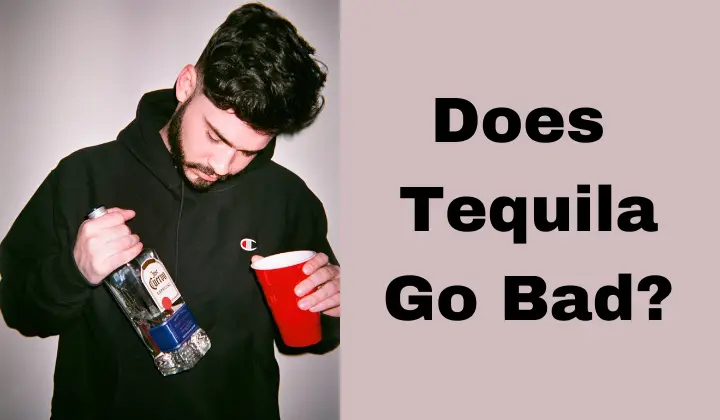
Hello, Neat post. There’s a problem along with your website in internet explorer, would check this… IE still is the marketplace leader and a good component of other folks will miss your magnificent writing because of this problem.
I really like your writing style, good info , appreciate it for putting up : D.
oz8fi3
I have recently started a web site, the information you provide on this website has helped me tremendously. Thank you for all of your time & work.
I must express some appreciation to this writer just for rescuing me from such a scenario. As a result of looking through the world-wide-web and seeing principles which were not powerful, I thought my entire life was done. Existing minus the approaches to the difficulties you’ve sorted out by means of your entire short post is a serious case, and those that would have badly damaged my career if I hadn’t discovered your web page. Your actual talents and kindness in handling everything was useful. I don’t know what I would’ve done if I hadn’t encountered such a point like this. I am able to at this moment look ahead to my future. Thanks a lot so much for this high quality and result oriented guide. I won’t think twice to propose your blog to any person who ought to have tips on this subject.